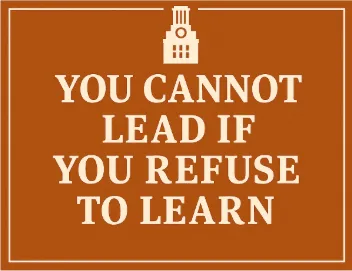Andy Lemon, Director of Programs, RecSports

1. Describe your role for UT.
I manage a team of 12 full-time and over 350 part-time student employees, catering to students, faculty, and staff seeking recreational programs and experiences. We offer an array of activities including sports programs, fitness classes, personal training, intercollegiate sport clubs, instructional lessons, health coaching, and outdoor adventures. I believe I have the best job on campus; we work hard to ensure that visitors have the best experience of their day. I'm fortunate to work with a team that prioritizes this mission in service to the students and community at UT.
2. What was the most important lesson you learned as a new manager?
You manage people, not projects. Early in my career, I thought the bottom line and outcome were all that mattered. This type of leadership can drive results, but it can potentially drive away your best contributors. I learned that people have emotions and lives with highs and lows. As a manager, you must navigate these aspects to help your team achieve organizational goals while acknowledging their humanity. Managing people effectively makes project management much easier. Learn what motivates each member of your team, help identify and remove obstacles to their success, invest in their professional and personal growth, ensure their work is aligned with your organization's goals, and be their biggest cheerleader.
3. What advice do you have for managers to help develop their team?
In addition to treating your people like people, and not just resources, it’s important to think about your staff as moldable minds. I want a team that is autonomous and knows how to find answers and solutions in an ever-changing landscape of policies, regulations, and expectations. The more they rely on me, the more they become reliant on my expertise (which may be limited in certain topics), so I hope to help build their capacity to problem solve. Helping my staff see the bigger picture beyond their role, educating the team on budget expectations, explaining decisions that are not always the most popular but necessary, offering transparency in decision-making where appropriate, and including my team in discussions about policy and impact are a few things we do pretty regularly that helps build the leadership capacity of our team.
4. Why is learning in the workplace important?

Both your team and your customers are transient, especially in higher education. We deliver recreational programs to the campus community, and our methods have evolved over RecSports' 100-year history. Across the university, the methodology may change, but the mission of educating the leaders of tomorrow does not. You must be willing to learn and adapt to ensure our processes and practices are making the desired impact on today’s students, not the students from 20 years ago. Additionally, I believe working at a premier institution offers the opportunity to lead with innovative ideas, as colleagues nationwide look to us for inspiration. You cannot lead if you refuse to learn.
5. What have you recently learned, what are you currently learning about, or how are you developing yourself as a professional?
I strive to listen, although my team may not always perceive it that way. Understanding what motivates my team's different personality types helps me know when and how they need support. Leaders often serve as sounding boards and don't need to solve all problems. I continue to educate myself on when to listen, ask questions, and provide additional support.
Contact
For questions about or requests for services, contact L&D through our brief intake form.
